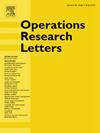Q张量元组到多项式互补问题
IF 0.9
4区 管理学
Q4 OPERATIONS RESEARCH & MANAGEMENT SCIENCE
引用次数: 0
摘要
本文的目标是引入一类新的结构化张量元组,称为q张量元组,它与多项式互补问题的解有关。讨论了q张量元组的一些特征。进一步,利用非负q张量元组研究了相应多项式互补问题解的唯一性。给出了至少包含两个非零分量的多项式互补问题的非零解的一个充分条件。本文章由计算机程序翻译,如有差异,请以英文原文为准。
Q tensor tuples to polynomial complementarity problems
The goal of this paper is to introduce a new class of structured tensor tuples, called Q-tensor tuple, which is associated with the solution of polynomial complementarity problems. Some characterizations of Q-tensor tuple are discussed. Furthermore, the uniqueness of the solution to the corresponding polynomial complementarity problems is investigated with a nonnegative Q-tensor tuple. A sufficient condition is given for the nonzero solution of the corresponding polynomial complementarity problem containing at least two nonzero components.
求助全文
通过发布文献求助,成功后即可免费获取论文全文。
去求助
来源期刊

Operations Research Letters
管理科学-运筹学与管理科学
CiteScore
2.10
自引率
9.10%
发文量
111
审稿时长
83 days
期刊介绍:
Operations Research Letters is committed to the rapid review and fast publication of short articles on all aspects of operations research and analytics. Apart from a limitation to eight journal pages, quality, originality, relevance and clarity are the only criteria for selecting the papers to be published. ORL covers the broad field of optimization, stochastic models and game theory. Specific areas of interest include networks, routing, location, queueing, scheduling, inventory, reliability, and financial engineering. We wish to explore interfaces with other fields such as life sciences and health care, artificial intelligence and machine learning, energy distribution, and computational social sciences and humanities. Our traditional strength is in methodology, including theory, modelling, algorithms and computational studies. We also welcome novel applications and concise literature reviews.
 求助内容:
求助内容: 应助结果提醒方式:
应助结果提醒方式:


